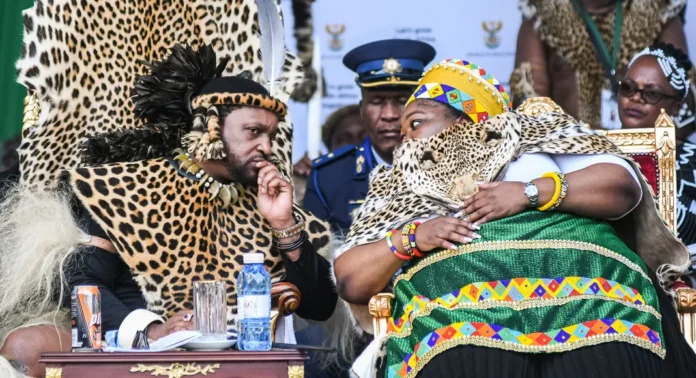In a move that has sent ripples through the Zulu nation, Queen KaMayisela Zulu has divorced King Misuzulu ka Zwelithini, marking the first divorce of an AmaZulu king in over 200 years.
Insiders close to Queen KaMayisela paint a picture of a marriage strained by the king's alleged extramarital affairs and the resulting media attention.
“This thing with the king has had a devastating mental toll on her. Although she was no longer happy in her marriage, the divorce was never on her mind,” one insider confided in Sunday World.
The source highlighted the toll of the king’s behaviour, often publicised on social media, on the queen and their children.
“The king’s troubles and his behaviour particularly, which was exposed on numerous occasions on social media, had strained their relationship. She felt the king exposed her and their children to undue media attention because of his extramarital affairs,” the source explained.
At one point, the queen reportedly expressed regret at marrying into the royal family.
The final straw, sources say, was the king's decision to take a third wife, Queen Nomzamo KaMyeni-Zulu, without Queen KaMayisela's knowledge or consent.
The queen’s absence from significant royal events in 2023, including the annual reed dance and the king’s 50th birthday celebration, further fuelled speculation of marital problems. Previously, she had publicly lamented the defamation of her character on social media, stemming from allegations of infidelity. “The defamation of my character on social media caused me and my children great distress,” she previously lamented.
The court papers detail the terms of the divorce. King Misuzulu will pay R20,000 in rehabilitative maintenance for 12 months for the couple's two children. While the marriage was in community of property, the king stated that there are no joint assets or liabilities, and personal belongings have already been divided. He has requested custody of the children.
“Aside from the communication regarding the parties’ children, there is no meaningful communication between the parties,” the papers further revealed.
The king's decision has sparked considerable debate, particularly concerning its implications for Zulu tradition. Professor Musa Xulu, a cultural expert, commented on the unprecedented nature of the divorce within the context of Zulu kingship.
“Traditionally the AmaZulu nation regards the institution of marriage as permanent and sacred and this move by the king was very surprising and shocking. As the king he should be the barometer on which the nation and his subjects should measure themselves in terms of behaviour and otherwise,” Professor Xulu stated. He added that, according to Zulu traditions, “an unmarried king is a weak king. The decision will weaken him as a king”.
Prince Mazwi Zulu of KwaMinyamanzi House, a senior member of the Zulu Royal family aligned with the king’s half-brother, Prince Simakade Zulu, criticised the king for what he termed an undermining of Zulu culture. He argued that the king should have sought mediation, a traditional African approach to resolving marital disputes.
“The king has abandoned African ways of solving marital matters and has adopted Western ways,” Prince Mazwi stated, emphasising the long-standing efficacy of mediation in preserving marriages within African families. He is a direct descendant of Prince Ndabuko, who was King Cetshwayo’s brother and fought alongside him in the famous battle of Isandlwana in 1879.
Professor Gugu Mazibuko, a Zulu cultural expert from the University of Johannesburg, echoed these concerns, calling upon the royal family elders to intervene and protect the image of the Zulu kingdom. She suggested that the elders, including matriarchs and queens from previous generations, could engage with the king and offer guidance.
“As much as we respect that since assuming the position of king, he culturally became an elder to all of us as his subjects regardless of age, when it comes to personal issues like marriage, the king can take advice from the elders. Particularly on matters like these that are an embarrassment to the nation so I am calling on the elders to rise and save the image of the throne and the Zulu nation,” she urged.
She highlighted the potential for this intervention to serve as a positive example for other struggling marriages, reminding couples of the traditional role of family mediation in resolving marital conflicts.
King Misuzulu has stated that he will not comment further on the matter. The divorce leaves the AmaZulu royal house facing significant cultural and social implications, prompting reflection on the intersection of tradition and modernity within the institution of the Zulu kingship.











